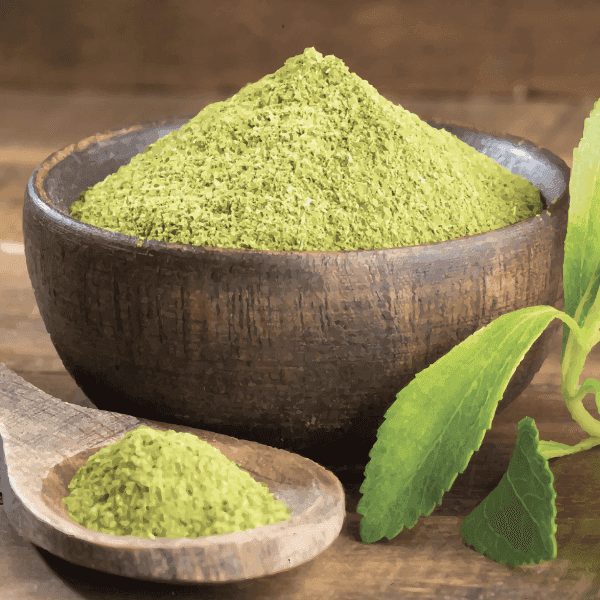
Stevia Leaf Powder {Organic}
Stevia leaf, from the stevia rebaudiana plant, is a calorie-free natural sweetener used in beverages and foods to reduce sugar intake. It's valued for its sweetness and potential benefits like blood sugar support and promoting dental health.
You might need stevia leaf if . . .
Perhaps you have a sweet tooth for sugar but hope to find a better alternative? Do you need a little help with weight management and skin health? This may be a perfect herb for you!
Stevia Leaf is a great choice for those who:
- Need help maintaining blood sugar levels
- Need some support in weight management
- Want a potential boost of antioxidants
- Have a sweet tooth and need to replace sugar
Benefits of Stevia Leaf
The benefits of using stevia include the possibility of lowering blood pressure, reducing inflammation, help with weight management, lowering LDL levels, benefiting oral health, and the fact that it has a glycemic index of zero means it will not raise your blood sugar levels. The reasoning behind these benefits comes from the fact that this herb contains many bioactive ingredients such as phenols, tannins, vitamins, and minerals! Keep in mind we are talking about the actual leaves of the stevia plant, not a highly processed powder form of stevia.
- Reduces inflammation: This benefit is made possible because it has been researched that the herb may reduce the production of inflammatory cytokines.
- May support the immune system: The extract of the stevia plant can inhibit the activity of many pathogenic bacteria and has been used to support those with immune diseases and to reduce swelling.
Common Ways to Use Stevia leaf
Tea: Add a stevia leaf or two to your loose-leaf tea to enjoy the sweet benefits instead of adding any actual sugar.
Extract: Making an extract with the pure stevia leaves is quite simple and will leave you with a powerful sweetener that also contains many health benefits.
Powder: You can purchase (or grow then dry your own) stevia leaves and use a coffee grinder to turn them into a powder. You could then use it as a sweetener in various recipes!
Growing and Foraging Information
Stevia is an herb you are likely able to find at your local plant nursery to bring home and add to your garden. You can easily buy dried stevia leaf online. But did you know in many parts of the United States, you could grow your own? If you prune back your stevia plant a few times in the year, you’ll have plenty to use fresh and in recipes throughout the summer months. Like most herbs, Stevia thrives in full sun in all but the very hottest of climates.
Safety Concerns
Stevia has been known to people since ancient times. Once again, we are talking about the pure leaf, not the modern ultra processed stevia sweeteners on the market. The Guarani Indians called Stevia “Ka-a He-e,” which means “sweet grass,” and used it to savor bitter drinks such as mate. Most Europeans learned about the plant only in the late 19th century, after stevia was introduced and promoted by the botanist Moises Santiago Bertoni. In 1901, Bertoni wrote that a few leaves of stevia grass were enough to sweeten a large cup of tea. It is important to consider safety concerns in the context of history. You also must realize that many of the departments that bring up safety concerns, are responsible for managing pharmaceutical drugs that have been manufactured in recent history. In the United States, there is no controlling authority or regulatory board specific to herbs. The most common reason you will see that these organizations bring up to question the safety of various herbs is “insufficient evidence to determine safety.” Since there is no way to patent a naturally growing plant, there is often insufficient funding to conduct massive human studies.
Drug Interaction: If you are taking any prescription medications, it is important to always consult with the prescriber before adding any herbs to your diet.
Breastfeeding and Pregnancy: Yes, stevia is safe to consume during pregnancy, but only in moderation. The FDA advises avoiding whole-leaf stevia and unrefined stevia (including home-grown stevia) while pregnant, due to concerns about the kidneys and reproductive system. If pregnant, speak with your naturopathic or primary care doctor. Stevia has no specific lactation-related uses. No data exists on the excretion of any components of stevia into breastmilk or on the safety and efficacy of stevia in nursing mothers or infants.
Other Concerns: Stevia leaf is considered a diuretic, so kidney damage is possible if you consume large quantities. It has also on occasion been reported to alter gut bacteria negatively.
Select Studies about Stevia leaf
Natural sweetener Stevia rebaudiana: Functionalities, health benefits and potential risks
This article is by the National Center for Biotechnology Information and is very informative about the benefits and potential risks of stevia.
Can stevia benefit people with diabetes?
A 2016 study reported that dried stevia leaf powder significantly lowered blood sugar levels in people with diabetes, both while fasting and after eating. The participants in the study also saw a reduction in their triglyceride and cholesterol levels.